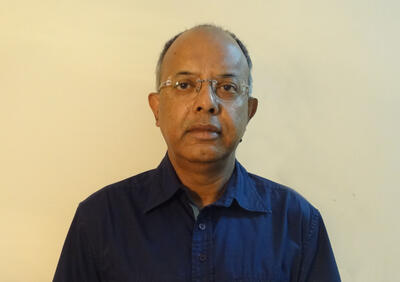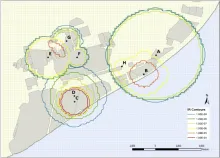Sandip Roy
-
sr@iitb.ac.in

Education
Research
Current Research & Development
Our current research interests comprise: (i) Process Safety and Risk Management; (ii) Combining Safety and Sustainability Principles for Process Design, and (iii) High-pressure Fluid-based Processing. The sub-areas within these domains that are being investigated presently are:
- Risk-based Decision-making for Process Safety Management, Cultural Determinants of Process Safety Management Systems, and Industrial Risk Governance; Development of Safety and Sustainability Metrics, Decarbonization of the Indian Oil and Gas Industry
- Solid Nucleation from Supercritical Fluids; Anti-solvency-based precipitation of Active Pharmaceutical Ingredients (APIs) from Subcritical fluids; Gas-bubble Surface enabled Heterogeneous Nucleation of Solids, Supercritical Fluid-based Textile Dyeing, Supercritical Fluid-based Polymer Recycling
Process Safety and Risk Management
In the area of process safety management, one of our current focus is on risk-based optimization of investment in safety systems that is expected for a green-field project. In addition, the framework for optimizing such an investment is being extended to aid decision-making for fixing annual safety expenditure for an established plant. Both these categories of expenditures are required to be met for a typical process plant. The rationale for investigating this area is to develop an over-arching framework that may allow an organization to optimize safety investments while at the same time meeting safety regulations and the need for insuring select critical risk sources.
The other area of research encompasses the role of national and organizational culture in determining the safety culture of an organization. It is well recognized today that cultural attributes of a people can subtly yet strongly determine the beliefs, attitudes and eventually safety policies of an organization, and that the efficacy of such “habits and strategies” can constitute critical underlying factors that shape both the safety and business performance of an organization. We wish to understand the impact that safety culture has on organizational performance.
Other areas of ongoing research that are expected to be consolidated are: Risk-based Process Plant Layout Optimization; Risk-based Land-use Planning around Process Facilities, and Development of Methods to incorporate Safety and Sustainability in Process Design, and Industrial Risk Governance, Risk-based Maintenance Scheduling.
On the domain of combined analysis of safety and sustainability our current work focuses on development of metrics / indices for human development that is sustainable. The principles of safety and sustainability are also being merged into a composite framework for analysis of technologies.

High-pressure (Supercritical) Fluid-based Processing
The other strand of research in our laboratory is on high-pressure fluid-based precipitation of solids, both on experimental and theoretical fronts. On the experimental side, development of more sophisticated systems for tracking and measuring particle nucleation rates, both for liquid-phase anti-solvency-based nucleation as well as for gas-surface mediated particle.
formation is being explored. The prospect of using gas bubbles to precipitate solid particles offers distinct advantages, but remains a largely unexplored area. New research results in this domain can potentially alter the present industrial practice of using seeded crystallization processes for generation and control of size of API particles.
In the area of theoretical representation of such precipitation processes there are significant lacunae of the classical nucleation theory (CNT) that have been recorded in the existent literature as well as in our ongoing work. This pertains to the mismatch between the predicted homogeneous and heterogeneous rates and those measured experimentally. The problem needs to be addressed by a better formulation of the details of physical processes underlying the nucleation phenomena and their corresponding mathematical representation. In addition, the problem may be addressed through Molecular Dynamic Simulation, a research program that has been initiated presently.
Polymer recycling poses a critical challenge today, especially those containing halogens and other hazardous moieties. Presently a series of studies are underway in our laboratory to recycle PVDC using supercritical water as a medium.

Sustainability Management
Decarbonization toward a net-zero carbon status is the goal for many businesses and countries as a way of contributing to the mitigation of global climate change. The energy sector accounts for 75.8% of India's total GHG emissions. India’s total energy consumption increased from 414 Mtoe in 2013-14 to 597 Mtoe in 2023-24. and will continue to rise in the future due to anticipated socio-economic development. Petroleum refining contributes to around 15% of India’s total GHG emissions, and this sector will continue to play an important role in India’s future energy matrix. Since more than 70% of the current energy demands are met from fossil fuels like coal and oil, the GHG emissions will continue to rise in the absence of commensurate strategic interventions. Decarbonization of refineries through the use of green hydrogen has recently gained critical attention. Our present work in this area involves both techno-economic analysis (TEA) and cradle-to-grave life cycle assessment (LCA) of green hydrogen production via water electrolysis in the Indian context. In addition, development and optimization of the near- and longer-term transition pathway for refineries towards assessment and adoption of green hydrogen and attendant technological options are under study.

Research Areas
Sub Areas
- Process Safety and Risk Management
- Supercritical Fluids


